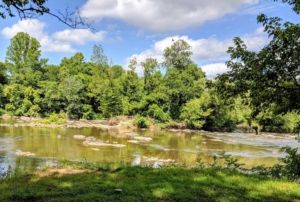As part of the MVP Southgate’s regulatory review, the project team applied to the North Carolina Department of Environmental Quality (NC DEQ) for a state water quality certification permit.
This application includes extensive details about the project’s proposed crossing of creeks, streams and rivers along the 48-mile route in North Carolina, as well as other comprehensive plans to protect natural resources.
The efforts include:
- Reducing the right-of-way during construction from 100 feet to 75 feet in most wetlands and at waterbody crossings.
- Avoiding any crossing of the Haw River.
- Proposing horizontal directional drilling to cross the Dan River and Stony Creek, and conventional bore techniques to cross Cascade, Deep and Wolf Island creeks, both of which would avoid direct impacts to the waterbodies and aquatic habitats.
MVP Southgate’s plans have been developed in consultation with NC DEQ, the Federal Energy Regulatory Commission (FERC) and other public agencies.
This collaboration has contributed to the successful design of an important project that would result in no permanent impact on streams, and no permanent loss of wetlands.
Unlike roads or other typical development projects, the MVP Southgate project won’t result in large swaths of impervious land or an altered grade. The project’s permanent footprint is a 50-foot wide green-field right-of-way. The pipeline would be buried at least three feet underground, with the surface re-graded to pre-construction conditions and revegetated with native plant species.
No herbicides would be used within 100 feet of wetlands or waterbodies unless directed to do so by an appropriate public agency; elsewhere, locally certified personnel would apply a biodegradable herbicide to help maintain the right-of-way.
Hundreds of miles of natural gas, water and sewer pipelines have been successfully constructed – and remain in operation – in Rockingham and Alamance counties. These projects provide essential public services to homes and businesses without posing permanent or adverse impacts on water quality.
The MVP Southgate team is fully committed to safely and responsibly constructing the proposed project to meet the natural gas demands of residential and commercial customers in North Carolina. Since announcing the project in April 2018, the team has made more than 1,200 adjustments to the route based on feedback from landowners, engineering considerations and efforts to avoid sensitive resources.
In July 2019, the FERC issued a Draft Environmental Impact Statement that concluded the MVP Southgate project could be built successfully and with no long-term or significant impacts to fisheries, wildlife, groundwater or surface water resources.
More information on NC DEQ’s review of the project, and how to provide NC DEQ with feedback on MVP Southgate, can be found here.





